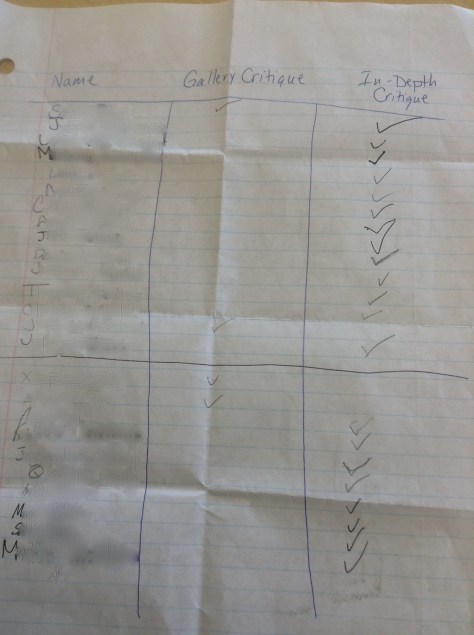 I didn’t write a Slice last week because I’ve been participating in NaNoWriMo, and I spent last Tuesday writing all evening. I did want to share a quick Slice this week because I have a few things on my mind—the first two just housekeeping items.
I didn’t write a Slice last week because I’ve been participating in NaNoWriMo, and I spent last Tuesday writing all evening. I did want to share a quick Slice this week because I have a few things on my mind—the first two just housekeeping items.
First of all, I’m prepping for attending NCTE at the end of next week, and I’m hoping to see you all there. If we run into each other, please say hi. Also, if you want to connect while we’re there, let me know that, too.
Second, for those of you who wondered, my AP Audit was accepted. I have written before about how much work went into it. I was relieved and gratified when it passed without any suggested revisions or edits, and I sincerely thanked my instructor, who emphasized the importance of including clear revision policies on the syllabus.
The revision policy leads me to my next point. I have been assigning AP-style multiple choice practice to my students and counting it as a quiz grade. I give students a passage and ten questions at a time. I use total points, so I just count the quizzes ten points. I decided after the first such quiz to allow students who earned 7/10 or less an opportunity to do corrections. I mentioned this policy to my class, and one of my students pointed out he wasn’t sure it was fair for those who earned an 8/10 or better not to have a shot as well. I wasn’t sure if earning back one or two points would make a big difference in the grand scheme of things, but I acknowledged he was right and said anybody could do corrections. Not all of my students opt to do so. Many of them do, however, and after a couple of rounds of quizzes, I’m really pleased that I decided to allow students to do corrections and also that I listened to my student’s feedback about broadening the policy. Analyzing where they went wrong and determining why the correct answer is indeed correct will help them build their analysis skills so that they will perform better on the exam. Even if they opt not to take the exam, it will serve them well in terms of helping them analyze the questions more critically.
Just as an example of the thinking that students do on these quizzes, I offer the following examples. Students were quizzed over the passage near the end of King Lear (5.3) when Edgar is filling in the others on where he has been and what he’s been doing. He says, “List a brief tale, / And when ’tis told, O, that my heart would burst!”
One question on the quiz asked
“The word “list” in line 2 means”
-
Tell.
-
Enumerate.
-
Count.
-
Listen.
-
Cunning.
Many students missed this question because “list” is used today more like “B. Enumerate.” However, in the context of the quote, that answer doesn’t make sense, and that particular answer did not prove to be the distractor, as I assumed it would be. Students seemed able to eliminate both “C. Count” and “E. Cunning” with no trouble. They had a little more trouble with the one I thought they would NOT be confused by because Edgar tells his story, so why would he be asking Albany to “A. Tell” a story?
From one student who gave the answer “A. Tell,” his reasoning:
The answer should be D—listen—because it makes more sense for Edgar to be instructing Albany to hear a tale rather than having him tell one, especially when Edgar goes on to tell his story. It caught me off guard a little because I thought that “tell” fit best grammatically, but the idea was wrong.
I thought his reasoning was really interesting and showed a lot of insight into why it might have tripped the students up. He is right: “tell” does fit best grammatically. It might be better to say “listen to” for D to work grammatically, but the answer is, indeed, D, as the student reasoned, and for the reasons he describes.
Another student who missed the same question and provided the same incorrect answer said the following in her correction:
In line 2 it says “List a brief tale, And when ’tis told, O, that my heart would burst.” Here list means to listen, because then it continues on to say when I am done telling my story my heart will burst. It does not make sense for list to mean tell because within the same sentence it says when its [sic] done being told, therefore it wouldn’t make sense to “tell” a story when it is being “told.”
I see what she’s saying, and I think she understands how she went wrong based on what she says in the first part, though it might be more accurate for her to say it doesn’t make sense for Edgar to ask Albany to “tell” him a tale when he then goes on to tell one himself.
A third example from a student who also chose the same answer, “A. Tell”:
Although I initially chose A., the correct answer is D. Although “Listing” and “telling” are both highly synonymous words, the context makes it clear that Edgar is not ordering that the story is being told: “List a brief tale / And when ’tis told, O, that my heart would burst (Lines 1-2). If Edgar was ordering that the story be told, then he would speak in the 2nd person, i. e. “And when thou tells it.” The term “tell” and “enumerate” are also soullessly [sic] synonymous that there would not be now a clear answer if either A. or B. had been chosen.
This student clearly reasons through why he was confused, and it has more to do with the answer I thought would be the distractor: “B. Enumerate.”
One last example:
The reason I put “A. Tell” for this one is because at the end of the sentence Edgar says, “List a brief tale, / And when ’tis told” when I saw “told” I figured “List” was another way of saying “tell.” Before I went and second guessed myself I thought the correct answer was “D. Listen,” evident on my quiz because it was the only other answer I didn’t cross off. “Listen” makes more sense in the context of the statement.
This last student gets to one of the most common reasons students make errors with multiple choice questions: they second-guess themselves and think their first hunches are wrong.
I am learning some really interesting things about my students’ thinking by reading through their quiz corrections. Ultimately, I think it’s great for them to think through why they answered incorrectly and explain why the correct answer is the best answer. It will help them approach these questions with more confidence in the future. I am not concerned about any sort of artificial inflation. I asked myself if I was more concerned about grades or whether or not students learned the material. Since the answer for me is obviously the latter, then I’m happy to give them points back for thinking through their mistakes.

 I have been writing this blog post in my head for months now, and I’m not sure I will really capture what I’m thinking.
I have been writing this blog post in my head for months now, and I’m not sure I will really capture what I’m thinking.


